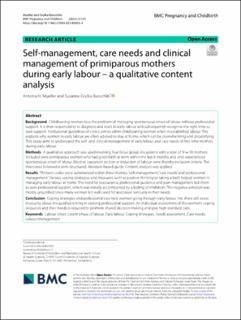Please use this identifier to cite or link to this item:
https://doi.org/10.21256/zhaw-27530Full metadata record
| DC Field | Value | Language |
|---|---|---|
| dc.contributor.author | Mueller, Antonia N. | - |
| dc.contributor.author | Grylka-Baeschlin, Susanne | - |
| dc.date.accessioned | 2023-04-04T07:21:07Z | - |
| dc.date.available | 2023-04-04T07:21:07Z | - |
| dc.date.issued | 2023-03-18 | - |
| dc.identifier.issn | 1471-2393 | de_CH |
| dc.identifier.uri | https://digitalcollection.zhaw.ch/handle/11475/27530 | - |
| dc.description.abstract | Background: Childbearing women face the problem of managing spontaneous onset of labour without professional support. It is their responsibility to diagnose and react to early labour and subsequently recognise the right time to seek support. Institutional guidelines of clinics aim to admit childbearing women when in established labour. This explains why women in early labour are often advised to stay at home, which can be overwhelming and dissatisfying. This study aims to understand the self- and clinical management of early labour and care needs of first-time mothers during early labour. Methods: A qualitative approach was used involving four focus group discussions with a total of N = 18 mothers. Included were primiparous women who had given birth at term within the last 6 months and who experienced spontaneous onset of labour. Elective caesarean section or induction of labour were thereby exclusion criteria. The interviews followed a semi-structured, literature-based guide. Content analysis was applied. Results: Thirteen codes were summarised within three themes: ‘self-management’, ‘care needs’ and ‘professional management’. Various coping strategies and measures such as positive thinking or taking a bath helped women in managing early labour at home. The need for reassurance, professional guidance and pain management led them to seek professional support, which was initially accompanied by a feeling of inhibition. This negative emotion was mostly unjustified since many women felt well cared for and taken seriously in their needs. Conclusion: Coping strategies and professional care help women going through early labour. Yet, there still exists insecurity about the justified timing in seeking professional support. An individual assessment of the women’s coping resources and their needs is required to promote shared decision making and give high-standard care. | de_CH |
| dc.language.iso | en | de_CH |
| dc.publisher | BioMed Central | de_CH |
| dc.relation.ispartof | BMC Pregnancy & Childbirth | de_CH |
| dc.rights | http://creativecommons.org/licenses/by/4.0/ | de_CH |
| dc.subject | Care need | de_CH |
| dc.subject | Coping strategy | de_CH |
| dc.subject | Early labour | de_CH |
| dc.subject | Labour management | de_CH |
| dc.subject | Labour onset | de_CH |
| dc.subject | Latent phase of labour | de_CH |
| dc.subject | Need assessment | de_CH |
| dc.subject | Pregnancy | de_CH |
| dc.subject | Female | de_CH |
| dc.subject | Human | de_CH |
| dc.subject | Cesarean section | de_CH |
| dc.subject | Parturition | de_CH |
| dc.subject | Parity | de_CH |
| dc.subject | Mother | de_CH |
| dc.subject | Labor, obstetric | de_CH |
| dc.subject.ddc | 618.4: Geburt | de_CH |
| dc.title | Self-management, care needs and clinical management of primiparous mothers during early labour : a qualitative content analysis | de_CH |
| dc.type | Beitrag in wissenschaftlicher Zeitschrift | de_CH |
| dcterms.type | Text | de_CH |
| zhaw.departement | Gesundheit | de_CH |
| zhaw.organisationalunit | Institut für Hebammenwissenschaft und reproduktive Gesundheit (IHG) | de_CH |
| dc.identifier.doi | 10.1186/s12884-023-05453-4 | de_CH |
| dc.identifier.doi | 10.21256/zhaw-27530 | - |
| dc.identifier.pmid | 36934219 | de_CH |
| zhaw.funding.eu | No | de_CH |
| zhaw.issue | 1 | de_CH |
| zhaw.originated.zhaw | Yes | de_CH |
| zhaw.pages.start | 191 | de_CH |
| zhaw.publication.status | publishedVersion | de_CH |
| zhaw.volume | 23 | de_CH |
| zhaw.publication.review | Open peer review | de_CH |
| zhaw.funding.snf | 199085 | de_CH |
| zhaw.funding.zhaw | Entwicklung und Validierung eines Tools für die Beratung von Erstgebärenden in der Latenzphase (GebStart-Studie) | de_CH |
| zhaw.author.additional | No | de_CH |
| zhaw.display.portrait | Yes | de_CH |
| Appears in collections: | Publikationen Gesundheit | |
Files in This Item:
| File | Description | Size | Format | |
|---|---|---|---|---|
| 2023_Mueller-Grylka_Self-management-care-needs-clinical-management-primiparous-mothers.pdf | 925.96 kB | Adobe PDF |  View/Open |
Show simple item record
Mueller, A. N., & Grylka-Baeschlin, S. (2023). Self-management, care needs and clinical management of primiparous mothers during early labour : a qualitative content analysis. BMC Pregnancy & Childbirth, 23(1), 191. https://doi.org/10.1186/s12884-023-05453-4
Mueller, A.N. and Grylka-Baeschlin, S. (2023) ‘Self-management, care needs and clinical management of primiparous mothers during early labour : a qualitative content analysis’, BMC Pregnancy & Childbirth, 23(1), p. 191. Available at: https://doi.org/10.1186/s12884-023-05453-4.
A. N. Mueller and S. Grylka-Baeschlin, “Self-management, care needs and clinical management of primiparous mothers during early labour : a qualitative content analysis,” BMC Pregnancy & Childbirth, vol. 23, no. 1, p. 191, Mar. 2023, doi: 10.1186/s12884-023-05453-4.
MUELLER, Antonia N. und Susanne GRYLKA-BAESCHLIN, 2023. Self-management, care needs and clinical management of primiparous mothers during early labour : a qualitative content analysis. BMC Pregnancy & Childbirth. 18 März 2023. Bd. 23, Nr. 1, S. 191. DOI 10.1186/s12884-023-05453-4
Mueller, Antonia N., and Susanne Grylka-Baeschlin. 2023. “Self-Management, Care Needs and Clinical Management of Primiparous Mothers during Early Labour : A Qualitative Content Analysis.” BMC Pregnancy & Childbirth 23 (1): 191. https://doi.org/10.1186/s12884-023-05453-4.
Mueller, Antonia N., and Susanne Grylka-Baeschlin. “Self-Management, Care Needs and Clinical Management of Primiparous Mothers during Early Labour : A Qualitative Content Analysis.” BMC Pregnancy & Childbirth, vol. 23, no. 1, Mar. 2023, p. 191, https://doi.org/10.1186/s12884-023-05453-4.
Items in DSpace are protected by copyright, with all rights reserved, unless otherwise indicated.